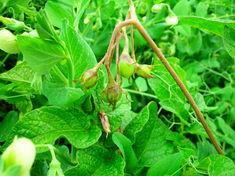
New trial data from Birds Eye has confirmed the importance of integrating the use of pre-emergence herbicides such as Nirvana in managing the potential threat of potato apples in vining peas, a contamination threat that can lead to complete crop rejection.
Birds Eye has been looking at ways of reducing the problem of potato apples, or berries as they are also called, in vining peas over a three-year period.
Andrew Whiting, agronomy manager for Birds Eye, said: “Trials and commercial usage have already demonstrated that the use of Nirvana in fields where potato volunteers are likely to be a problem reduces the number of potato berries going into the factory or spotted during scanning in the factory. This year, we looked at two different dose rates of Nirvana, 3 l/ha and 3.5 l/ha. The higher dose rate reduced the number of potato flowers and hence the potato volunteer’s ability to produce berries by 78 per cent, which was a very good result. It was also crop safe.”
Whiting said that potato berries are produced by potato tubers left in the soil from a previous crop and are of similar size and colour to peas. He said: “If they are left in the crop, they will contaminate the vining pea sample and lead to rejection. We advise growers to use an integrated programme based on drilling dates and the use of Nirvana, which is the only really effective chemical solution we have.
“Potato apples are formed on potato volunteers usually after the end of June. Vulnerable crops are therefore those which are harvested after this time. Crops of vining peas drilled from April onwards would normally be at risk and we would recommend the use of Nirvana.”
Jonathan Ball, pulse marketing specialist for BASF, said: “Containing imazamox and pendimethalin, Nirvana controls the all-important weeds in vining peas including Black-bindweed, Charlock, Common Poppy, Fat-hen, Knotgrass, Orache and Redshank, as well as Common Chickweed, Fumitory, Henbit Dead-nettle, Speedwells, Red Dead-nettle and Scarlet Pimpernel. With vining peas being uncompetitive early on, it is important that these weeds are removed as effectively as possible.”



